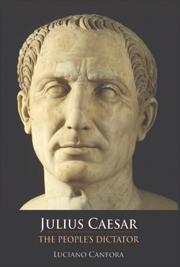Foreword
Published online by Cambridge University Press: 05 August 2013
Summary
‘While writing my Caesar, I have realised that I must never for a moment let myself believe that things necessarily had to turn out the way they did’, wrote Brecht in his Arbeitsjournal. After this his lines take a wandering course, detracting somewhat from the force of that initial thought. Brecht becomes entangled in unprofitable reflections on the non-inevitability of the ancient slave-owning social order. But a little later he returns to his initial idea and takes issue with the optimistic and ultimately arbitrary notion of ‘seeking the causes of everything that happened’. Hence the pungent criticism of those impersonal expressions so commonly found in historical writing (‘this or that was done because …’), which should lead any historian to ask, ‘done by whom’?
The events which provide the material for this book lend themselves as much as any to such anti-deterministic reservations. We are dealing with political and military facts which might at any juncture have yielded results quite opposite to those which actually transpired. To take only the last phase, this is clear from the extraordinary strength and endurance of Caesar's opponents in the civil war: it took years of fierce, pitiless and bloody fighting to wear them down, without any truly decisive battle taking place.
- Type
- Chapter
- Information
- Julius CaesarThe People's Dictator, pp. ix - xviPublisher: Edinburgh University PressPrint publication year: 2007



